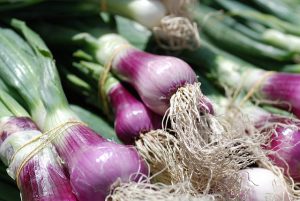Organic farming improves onion quality production and soil health, reduces yield
 Photo credit: Graham Hellewell
Photo credit: Graham Hellewell
A new study published in the journal Archives of Agronomy and Soil Science compared the effects of organic and conventional farming on onion yield, onion chemical quality, and soil health indicators--soil organic carbon and microbial activity. Organic plots were treated with either farmyard manure, poultry manure, vermicomposting or neem cake, and all organic treatments were compared to the conventional plots. Different fertility treatments did not result in significant differences in yield, onion quality, or soil quality in the organic plots. Compared to the conventional plots, onions grown in the organic plots had lower yield, higher levels of antioxidants including total phenol, total flavonoid, ascorbic acid and quercetin-3-glucoside. The organic plots also exhibited improved soil health with higher levels of soil organic carbon, a larger population of soil microbes, more enzyme activity from beneficial microorganisms and a higher fungus-to-bacteria ratio. From the findings, the authors concluded that organic farming is more sustainable than conventional farming.

